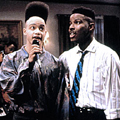
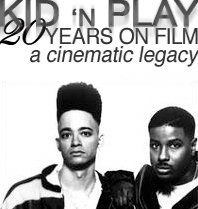 It goes without saying that this year of 2010 is the 20th anniversary of the release of the movie HOUSE PARTY starring the late ’80s/early ’90s pop rap duo Kid ‘n Play. The actual release was in March, of course, but we’re celebrating all year long. Please join me this week as we revisit all of Kid ‘n Play’s cinematic works and try to understand what the fuck we, as a nation, were trying to pull in the ’90s.
It goes without saying that this year of 2010 is the 20th anniversary of the release of the movie HOUSE PARTY starring the late ’80s/early ’90s pop rap duo Kid ‘n Play. The actual release was in March, of course, but we’re celebrating all year long. Please join me this week as we revisit all of Kid ‘n Play’s cinematic works and try to understand what the fuck we, as a nation, were trying to pull in the ’90s.
Okay, maybe I’m kidding and/or playing around here, but the truth is I remember HOUSE PARTY being actually kinda good, and I don’t think I ever saw the other ones, but I thought it might be interesting to watch all of them and see what the deal is.
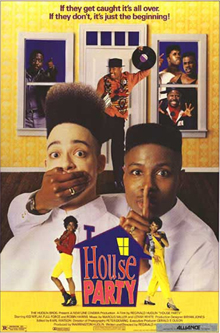 HOUSE PARTY is maybe not as good as I remember it, but it’s a likable low budget teen movie and I think actually pretty groundbreaking. After the success of SHE’S GOTTA HAVE IT (or possibly PENITENTIARY, according to the comments on this interview), New Line Cinema saw the commercial potential of independent black films and hired young filmatist Reginald Hudlin to expand his college thesis film into a feature. The result was probly one of the first hip hop films that wasn’t all about showcasing the hip hop. It’s more of a traditional teen movie than any previous movies about rappers, breakdancers or graffiti artists – at the dawn of the hip hop takeover of pop culture rappers were not a novelty anymore, they were just kids (or fat guys that eat a bunch of cake). Kid and Play (sort of kid’nplaying themselves, except in an alternate universe where one is named Peter instead of both being named Christopher) are excited about rapping at the party, but most of their focus is on getting laid, having a good party, not getting beat up and not getting in trouble from dad.
HOUSE PARTY is maybe not as good as I remember it, but it’s a likable low budget teen movie and I think actually pretty groundbreaking. After the success of SHE’S GOTTA HAVE IT (or possibly PENITENTIARY, according to the comments on this interview), New Line Cinema saw the commercial potential of independent black films and hired young filmatist Reginald Hudlin to expand his college thesis film into a feature. The result was probly one of the first hip hop films that wasn’t all about showcasing the hip hop. It’s more of a traditional teen movie than any previous movies about rappers, breakdancers or graffiti artists – at the dawn of the hip hop takeover of pop culture rappers were not a novelty anymore, they were just kids (or fat guys that eat a bunch of cake). Kid and Play (sort of kid’nplaying themselves, except in an alternate universe where one is named Peter instead of both being named Christopher) are excited about rapping at the party, but most of their focus is on getting laid, having a good party, not getting beat up and not getting in trouble from dad.
(Incidentally, we know the characters’ preferences in hip hop movies. At the end Play is excited to watch KRUSH GROOVE and BEAT STREET on “the late show.” When dorky Bilal mentions BREAKIN’ Play correctly shakes his head in disgust.)
A good rap duo (say Run DMC or Salt n Pepa) don’t have to be opposites, they don’t have to have a Laurel and a Hardy dynamic. But this movie sort of treats Kid ‘n Play as a comedy team more than a rap group, so they have to be distinguished somehow. Kid is established as the naive, well-meaning good kid, Play as the arrogant player. Actually he kind of reminds me of Theo Huxtable if Theo was a prick. I think Kid is supposed to be a little awkward (harder time with girls, picked on by bullies) but once you get to know him he’s supposed to be awesome. Also everybody likes the dances he knows. It’s not clear how they feel about his hair.
About the matter of the hair. The one thing everybody knows about Kid ‘n Play is the hair. Kid had one of the tallest hi-top fades anybody ever saw. In the movie it’s mostly accepted as normal, except by the older generation: Pop mumbles something about “head look like a Q-tip” and a cop calls him “Eraserhead.” I’ve never been sure if he meant to compare Kid to a number 2 pencil or to Jack Nance in the David Lynch movie, because either one works. I guess that just proves how multi-layered the movie is.
But you’re gonna have to get beyond the hair. It merely works as a lightning rod, attracting attention (lightning) to itself and then sending it off into the movie or music video beneath it.
One possible sign that Hudlin took influence from Spike Lee more than he did the PENITENTIARY guy is the stylized, show-offy camerawork in the intro, a dream sequence where an EVIL DEAD type POV cam floats up to a house full of people dancing, and the camera vibrates every time the bass kicks. The music is so powerful that the roof explodes off into space. Hudlin is a P-Funk fan, even put George Clinton in the movie later on, so here he’s literally depicting the Parliament phrase “tear the roof off the sucka.”
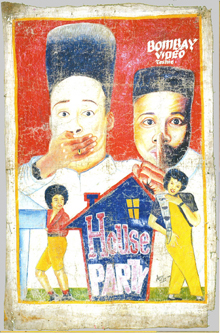 The story really starts in a high school cafeteria where Kid (actually age 26 at the time), Play (28) and their bad-breathed DJ friend Bilal (Martin Lawrence in his second movie, the first one was DO THE RIGHT THING) talk about the party Play is gonna have that night while his parents are on vacation (see the song “Parents Just Don’t Understand” for other activities to consider for this type of situation). Then Kid gets beat up by the musclebound school bully Stab and his brothers Pee-Wee and Zilla (played by Paul Anthony [age 30], Bowlegged Lou [29] and B-Fine [31] of the group Full Force). Also a bunch of jello gets thrown on a portrait of former president Ronald Reagan, for some reason still hanging in the cafeteria.
The story really starts in a high school cafeteria where Kid (actually age 26 at the time), Play (28) and their bad-breathed DJ friend Bilal (Martin Lawrence in his second movie, the first one was DO THE RIGHT THING) talk about the party Play is gonna have that night while his parents are on vacation (see the song “Parents Just Don’t Understand” for other activities to consider for this type of situation). Then Kid gets beat up by the musclebound school bully Stab and his brothers Pee-Wee and Zilla (played by Paul Anthony [age 30], Bowlegged Lou [29] and B-Fine [31] of the group Full Force). Also a bunch of jello gets thrown on a portrait of former president Ronald Reagan, for some reason still hanging in the cafeteria.
Kid gets in trouble from the fight so after school his mission is to prevent his Pop (standup comedian Robin Harris) from finding out so he’ll be allowed to go to the party. He’s able to dodge phone calls from the school, but not a letter. The weird thing is the mail already came, so apparently the school sends out messengers to hand-deliver letters from the principal through the parents’ mail slots at night. So he’s grounded and has to sneak out.
In the tradition of Homer’s The Odyssey, HOUSE PARTY is largely about the journey. Kid must pass obstacles including the harassment of white cops and the Stab brothers, and gunshots from a dude who he accidentally peeps on. Before he gets to the house party he crashes an outdoor fraternity reunion where a bored George Clinton is DJing for upper class middle aged folks, so Kid teaches him how to scratch and does a rap. It’s weird, usually in comedies the joke is that a seemingly uptight old white person learns how to rap or scratch, but not a freaky rainbow-haired titan of funk, soul and doo-wop.
The party itself is a great time capsule. They’re listening to LL and Public Enemy (“Can’t Do Nuttin For Ya Man”, not one of their best), girls are doing choreographed dances together, people are using some goofy slang. When the girl Kid likes (played by Tisha Campbell) says that her dad owns grocery stores Kid says, “I know y’all be snackin down. Crazy chips and dips.” And it seems like she’s charmed by that statement. What does it mean? I don’t know, shit changes over twenty years. I can’t translate that anymore.
Obviously Kid’s hair is an extreme example of ’90s fashion, but the whole movie is full of things that really did seem normal at the time but now are just eyesores. There are Zubaz pants, Vision Street Wear shirts and neon colored spandex (sometimes called “biker shorts” back then) worn with huge, puffy blouses and hairdos. But also supposed teens wearing suits and ties.
But unlike the previous year’s DO THE RIGHT THING, this movie mostly stays away from matters of racial tension that were so thick in the air at that moment in time between Howard Beach and Rodney King. DO THE RIGHT THING dealt with white cops killing innocent black people. Here two bumbling white cops are constantly harassing them, but it’s played as a joke more than a threat. Both the Stab Brothers and Pop have scenes where they repeatedly tell the cops to fuck off, and they get away with it. Racial profiling is treated more as a fact of life that can be joked about than an issue that has reached its boiling point. But that’s the tone of the movie, it wouldn’t be right to end in a race riot.
That’s because HOUSE PARTY isn’t about politics, it’s about getting girls. Kid actually goes after two different ones, playing the odds. He likes Tisha Campbell because of her “good hair, def body.” I woulda just thought “good hair” meant he liked how her hair looks, but I saw that documentary so now I know about weaves and all that. That was a really good movie. Maybe Chris Rock can make DEF BODY now.
There are musical numbers. Kid and Play (who are not yet a duo, they’re friends but seem to be rivals on the mic) have a freestyle battle at the party, but of course it’s a pre-written, pre-recorded lip synch. Later (in an homage to PENITENTIARY?) Kid ends up in jail and does a rap to convince all the fellas not to rape him. That’s probly the worst scene would be my guess.
There are references to AIDS, and there are references to rubbers, but I guess this was before accurate portrayals of safe sex. Kid is supposed to be a sensitive guy because he asks the girl if she has birth control, but he means a pill. He doesn’t seem to think about STDs outside of jail. Play doesn’t care about birth control because he knows he could just abandon the baby and child. When he says it it seems like you’re supposed to know that’s wrong, but not necessarily appalling.
I honestly didn’t expect this before starting this series, but after watching it again I do think HOUSE PARTY was a historically important movie in the black film movement of the ’80s and ’90s. For good or bad it may be the missing link between the political, critical-acclaim-seeking early films of Spike Lee and John Singleton and today’s more mainstream, less serious ones that are cast largely with rappers and standups.
I never realized that because it never occurred to me how much FRIDAY owes to HOUSE PARTY. I always thought FRIDAY was revolutionary for being the “hood movie” that was a light-hearted comedy about fucking around instead of a heavy-handed drama about staying out of gangs. But I forgot that HOUSE PARTY was there first. Both were released by New Line Cinema, starring rappers, taking place over the course of one day. Both have a really funny underrated comedian as the father of the main character, riffing and insulting the kid and being hilarious but also revealing little glimpses of caring and tenderness and shit. (In FRIDAY that comedian is John Witherspoon, who also had a part in HOUSE PARTY as the pissed off neighbor who keeps talking about “Public Enema.”) Both have a nice neighborhood girl that plays hard to get but falls for the main character’s sweetness over the course of the day. Both have an escalating confrontation with bullies (three Full Force members in HOUSE PARTY, one Deebo in FRIDAY). In fact, both have the non-rapper best friend played by a comedian who went on to become a big movie star (Martin Lawrence, Chris Tucker). Both had sequels of rapidly descending quality. Both have a shot from the POV of a guy who just got knocked the fuck out.
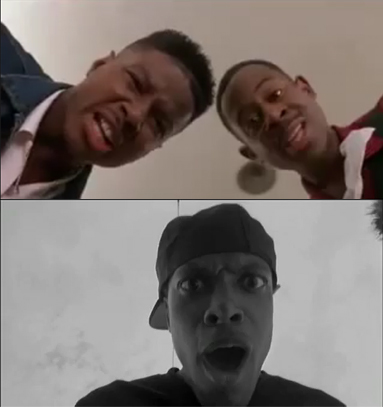
And they even have a similar mix of funny lines and juvenile humor (cartoon sound effects in HOUSE PARTY, John Witherspoon toilet humor in FRIDAY). It’s just funny that one stars some bubble gum goofballs known for a funny hair do and the thing where they jump over one of their own legs while dancing, the other stars (and was co-written and produced by) the creator of “Fuck Tha Police” and Amerikkka’s Most Wanted, whose lyrics actually attracted the attention of the FBI.
Of course FRIDAY also has alot of pot smoking. I think ultimately it sort of argues against pot, because it gets Craig into alot of trouble, but mostly it revels in it. HOUSE PARTY takes place in a world where there are not alot of visible drugs, and even the people drinking at the party are somewhat looked down on. Otherwise they’re pretty similar movies, though.
I think FRIDAY is a way better movie – funnier, better photography, better music, more effective with its emotional parts. But I’m not sure it could’ve existed without HOUSE PARTY. I bet Ice Cube and DJ Pooh looked at HOUSE PARTY as an example of how they could make their own independent comedy, and I’m sure it helped convince New Line Cinema there could be money in that.
Alot of the humor in HOUSE PARTY makes me groan, but there are some laughs too. Full Force play things the most broad, with Pee-Wee doing a squeaky cartoon voice where he keeps saying catch phrases like “I smell pussy” and “we’re gonna kick yer fuckin aaaa-ass.” But they made me laugh a couple times, like when they were afraid of a possum in an alley (thinking it’s a rat). But then Stab beats it down with a baseball bat. That guy is crazy, man. He actually tries to burn down the house that the party is in. So it’s funny when this maniac tries to ram through a door and his brother gets concerned, asking “Okay man? Your shoulder okay?”
I don’t remember ever saying anything like this about Martin Lawrence before, but his character is pretty funny in this. He’s not doing a bunch of mugging and desperately trying to be goofy, he’s just playing a character. He’s the not-as-cool third wheel of the trio who gets unfairly shit upon all the time and is too slow-witted to defend himself. He’s actually kind of like Steve Buscemi in THE BIG LEBOWSKI, they keep telling him to shut the fuck up. He also has a bedroom with an entire wall covered in carefully aligned pages from girly mags, and a big sign in the middle that says “SLIPPERY WHEN WET.” He has one line that’s one of the highlights, when he wants to top Kid and Play’s raps but all he can blurt out is “Oh yeah? Anything y’all could do, I also could do, but I also could do it better.”
But by far the best thing in the movie is Robin Harris as Pop. He probly gets more laughs as Sweet Dick Willie in DO THE RIGHT THING, but he’s got some good insults here, both for his own son and for every kid he runs into when he shows up at the party. And there are enough little moments to show that underneath that he really cares about his kid and just wants to protect him. Before he even knows about the fight he doesn’t want Kid to go to the party because he wants him to stay home and watch DOLEMITE with him. “You like DOLEMITE, don’t you? You grew up on it.”
He’s a single father, a widower, and he works hard. He falls asleep with his shoes on, and Kid takes his shoes off for him. It’s genuinely kinda sweet.
Well, okay, watching it again I don’t think this holds up as a classic, exactly. But it’s kinda good, in my opinion.
————-
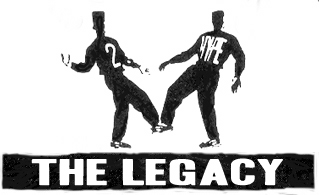


























December 13th, 2010 at 3:29 am
Ah yes, now we are talking. Screw Public Enemy. THIS is my kind of Hip Hop.
Nah, just kidding. Although I do have a big fat soft spot for late 80’s/early 90’s pop influenced Hip Hop. I never felt the urge to watch movies about/with it anyway.